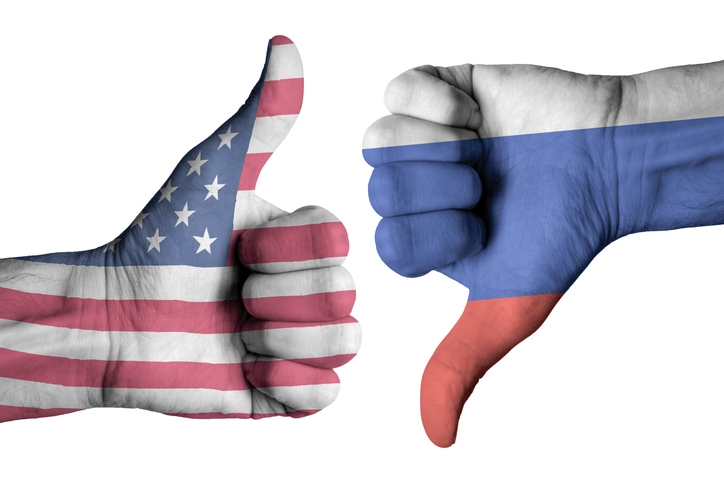Patterns: Trump, Russia and the 2016 Election: Picks of the Week
Vladimir Putin has a plan for destroying the West—and it looks a lot like Donald Trump | Slate
Is Trump a Russian Agent? A Legal Analysis | lawfareblog.com
Putin, Erdogan mend ties as post-coup Turkey turns toward Russia | Chicago Tribune
“Russia, if you’re listening, I hope you’re able to find the 30,000 emails that are missing.”
In a remarkable week that saw the first polls showing a Donald Trump bounce after the Cleveland convention while the Democratic party convention made history with the nomination of the first female candidate for president by a major political party, these 16 words stand out among a torrent of news.
“Russia, if you’re listening, I hope you’re able to find the 30,000 emails that are missing.”
In another historic first this week, Donald Trump invited a hostile foreign intelligence agency to hack his political opponent. Remarkably, Trump’s invitation did not spur the first speculation of Russian interference in America’s 2016 election. Days before the start of the Democratic party convention, Wikileaks released a trove of emails stolen from the Democratic National Committee earlier this year in a move clearly designed to embarrass the Clinton campaign and sow dissension within the Democratic party.
The release had all the earmarks of a Russian information operation—not the least of which were the Russian-language artifacts found in the documents on Wikileaks. More ominously, however, several American analysts over the last several years have made compelling cases that Wikileaks itself is a vehicle for Russian intelligence to gather intelligence under the guise of whistleblowing.
So the conversation had been joined when Trump looked square in the camera and said his now infamous 16 words:
“Russia, if you’re listening, I hope you’re able to find the 30,000 emails that are missing.”
In most cases, you could dismiss these 16 words as the ill-advised boasts of a carnival-barker turned presidential candidate who wanted to draw attention to Secretary Hillary Clinton’s poor judgment about the use of a private email server. Trump eventually said he was joking, though the video suggests he was deadly serious.
But most alarming is the emergence of a body of evidence suggesting alignment between candidate Trump and Russian strong-man Vladimir Putin. The case has been made resoundingly well by others, notably Josh Marshall, Anne Applebaum, and Franklin Foer. Each is worth a careful read in its own right, but there are some key facts:
- Donald Trump’s repeated bankruptcies have reportedly made him unattractive to American lenders. As loans from American banks became more difficult for him to win, he turned to Russian investors to underwrite his real estate ventures. Despite Trumps’ claims this week that he has no investments in Russia, the evidence of his financial ties to Russia is clear.
- Donald Trump’s campaign manager, Paul Manafort, worked for deposed Ukrainian president Viktor Yanukovich—who ultimately fled to Moscow after the people of Ukraine ousted him for abandoning plans to join the European Union, allegedly at the insistence of Vladimir Putin.
- While the Trump campaign took a largely hands-off approach to the drafting of the Republican party platform, media accounts indicate the campaign intervened on one issue, only, to eliminate language from the platform calling for the United States government to provide defensive arms to Ukraine, currently locked in a fight against Russian-backed separatist forces in eastern Ukraine.
- Trump has repeatedly called into question America’s commitment to NATO. In an interview with the New York Times just last week, he said he could not guarantee that under his presidency the United States would defend NATO allies Estonia, Latvia, and Lithuania—former Soviet republics that Russian Vladimir Putin is said to covet. (When Trump insisted he had been misquoted, after the firestorm of criticism ignited by the interview’s contents, the Times released the full transcript.) Trump doubled down this week when he said that the United States would have to leave NATO in order to get the allies to pick up a larger share of the defense burden. Reportedly, Trump told a crowd in North Carolina, “We have to walk. Within two days they’re calling back! Get back over here, we’ll pay you whatever the hell you want.”
- Finally, when asked whether he would consider eliminating economic sanctions imposed against Russia following its annexation of Crimea in 2014, Trump said he “would be looking into that.”
On balance, you have a major party’s nominee for President of the United States adopting positions in alignment with Russian foreign policy, while inviting that country’s spies to attack the communications of his political opponent. All of this is taking place against a backdrop of Russian use of “hybrid-warfare,” where information operations and political interference play an early and important role in manipulating an adversary’s public opinion and will. WikiLeaks is the current vehicle, as was noted above, but we’ve seen Russian information operations across Europe, including France, where the anti-immigrant National Front has sought and received funds from Putin’s Russia, and England—where the pro-BREXIT movement also received Russian financial support (and verbal encouragement from one Donald J. Trump).
Russian intervention in American electoral politics would be stunning, but Russian information operations in the United States are nothing new. In the 1970s and 1980s, for example, the U.S. intelligence community worried that Soviet intelligence would be able to use the accounts of UFO enthusiasts, who often provided detailed accounts of strange flight and performance characteristics of craft operating near American military bases, to glean insights about next-generation American aircraft, including stealth aircraft.
What’s new here is that with Wikileaks founder Julian Assange promising the release of more stolen emails, and confirmation, as of this writing, that the Clinton campaign’s emails were compromised, supposedly by Russia, we appear to have entered an age where Russian leaders believe they can intervene in American politics.
The only question I have left is whether Donald Trump and his advisers are witting of this intervention, or just dupes.

